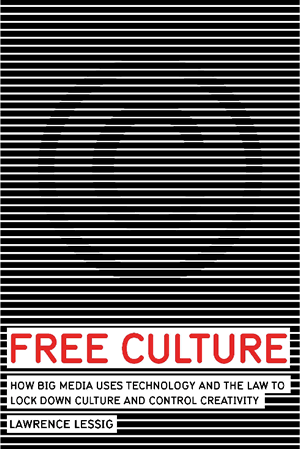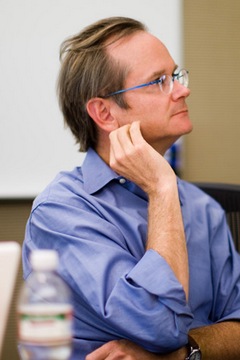
Free Culture
Expertly argued, alarming and surprisingly entertaining look at the current copyright wars.
Tag(s): Software Libre and Open Source
Publication date: 01 Mar 2004
ISBN-10: 1594200068
ISBN-13: n/a
Paperback: 352 pages
Views: 20,283
Type: Book
Publisher: Penguin Press HC
License: Creative Commons Attribution-NoDerivs-NonCommercial 1.0 Generic
Post time: 29 Jan 2005 05:34:20
Free Culture
 Expertly argued, alarming and surprisingly entertaining look at the current copyright wars.
Expertly argued, alarming and surprisingly entertaining look at the current copyright wars.
Tag(s):
Software Libre and Open Source
Publication date: 01 Mar 2004
ISBN-10: 1594200068
ISBN-13: n/a
Paperback: 352 pages
Views: 20,283
Document Type: Book
Publisher: Penguin Press HC
License: Creative Commons Attribution-NoDerivs-NonCommercial 1.0 Generic
Post time: 29 Jan 2005 05:34:20
Publication date: 01 Mar 2004
ISBN-10: 1594200068
ISBN-13: n/a
Paperback: 352 pages
Views: 20,283
Document Type: Book
Publisher: Penguin Press HC
License: Creative Commons Attribution-NoDerivs-NonCommercial 1.0 Generic
Post time: 29 Jan 2005 05:34:20
Summary/Excerpts of (and not a substitute for) the Creative Commons Attribution-NoDerivs-NonCommercial 1.0 Generic:
You are free to:
Share — copy and redistribute the material in any medium or format
The licensor cannot revoke these freedoms as long as you follow the license terms.
Click here to read the full license.
Share — copy and redistribute the material in any medium or format
The licensor cannot revoke these freedoms as long as you follow the license terms.
Click here to read the full license.
Book excerpts:
Lawrence Lessig could be called a cultural environmentalist. One of America's most original and influential public intellectuals, his focus is the social dimension of creativity: how creative work builds on the past and how society encourages or inhibits that building with laws and technologies. In his two previous books, Code and The Future of Ideas, Lessig concentrated on the destruction of much of the original promise of the Internet. Now, in Free Culture, he widens his focus to consider the diminishment of the larger public domain of ideas. In this powerful wake-up call he shows how short-sighted interests blind to the long-term damage they're inflicting are poisoning the ecosystem that fosters innovation.
All creative works-books, movies, records, software, and so on-are a compromise between what can be imagined and what is possible-technologically and legally. For more than two hundred years, laws in America have sought a balance between rewarding creativity and allowing the borrowing from which new creativity springs. The original term of copyright set by the Constitution in 1787 was seventeen years. Now it is closer to two hundred. Thomas Jefferson considered protecting the public against overly long monopolies on creative works an essential government role. What did he know that we've forgotten?
Lawrence Lessig shows us that while new technologies always lead to new laws, never before have the big cultural monopolists used the fear created by new technologies, specifically the Internet, to shrink the public domain of ideas, even as the same corporations use the same technologies to control more and more what we can and can't do with culture. As more and more culture becomes digitized, more and more becomes controllable, even as laws are being toughened at the behest of the big media groups. What's at stake is our freedom-freedom to create, freedom to build, and ultimately, freedom to imagine.
Lawrence Lessig could be called a cultural environmentalist. One of America's most original and influential public intellectuals, his focus is the social dimension of creativity: how creative work builds on the past and how society encourages or inhibits that building with laws and technologies. In his two previous books, Code and The Future of Ideas, Lessig concentrated on the destruction of much of the original promise of the Internet. Now, in Free Culture, he widens his focus to consider the diminishment of the larger public domain of ideas. In this powerful wake-up call he shows how short-sighted interests blind to the long-term damage they're inflicting are poisoning the ecosystem that fosters innovation.
All creative works-books, movies, records, software, and so on-are a compromise between what can be imagined and what is possible-technologically and legally. For more than two hundred years, laws in America have sought a balance between rewarding creativity and allowing the borrowing from which new creativity springs. The original term of copyright set by the Constitution in 1787 was seventeen years. Now it is closer to two hundred. Thomas Jefferson considered protecting the public against overly long monopolies on creative works an essential government role. What did he know that we've forgotten?
Lawrence Lessig shows us that while new technologies always lead to new laws, never before have the big cultural monopolists used the fear created by new technologies, specifically the Internet, to shrink the public domain of ideas, even as the same corporations use the same technologies to control more and more what we can and can't do with culture. As more and more culture becomes digitized, more and more becomes controllable, even as laws are being toughened at the behest of the big media groups. What's at stake is our freedom-freedom to create, freedom to build, and ultimately, freedom to imagine.
Tweet
About The Author(s)
No information is available for this author.
Book Categories
Computer Science
Introduction to Computer Science
Introduction to Computer Programming
Algorithms and Data Structures
Artificial Intelligence
Computer Vision
Machine Learning
Neural Networks
Game Development and Multimedia
Data Communication and Networks
Coding Theory
Computer Security
Information Security
Cryptography
Information Theory
Computer Organization and Architecture
Operating Systems
Image Processing
Parallel Computing
Concurrent Programming
Relational Database
Document-oriented Database
Data Mining
Big Data
Data Science
Digital Libraries
Compiler Design and Construction
Functional Programming
Logic Programming
Object Oriented Programming
Formal Methods
Software Engineering
Agile Software Development
Information Systems
Geographic Information System (GIS)
Mathematics
Mathematics
Algebra
Abstract Algebra
Linear Algebra
Number Theory
Numerical Methods
Precalculus
Calculus
Differential Equations
Category Theory
Proofs
Discrete Mathematics
Theory of Computation
Graph Theory
Real Analysis
Complex Analysis
Probability
Statistics
Game Theory
Queueing Theory
Operations Research
Computer Aided Mathematics
Supporting Fields
Web Design and Development
Mobile App Design and Development
System Administration
Cloud Computing
Electric Circuits
Embedded System
Signal Processing
Integration and Automation
Network Science
Project Management
Operating System
Programming/Scripting
Ada
Assembly
C / C++
Common Lisp
Forth
Java
JavaScript
Lua
Rexx
Microsoft .NET
Perl
PHP
R
Python
Rebol
Ruby
Scheme
Tcl/Tk
Miscellaneous
Sponsors
